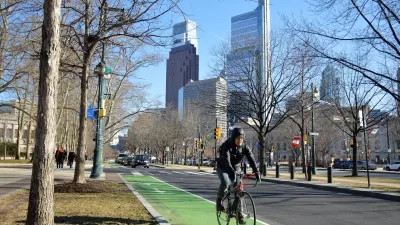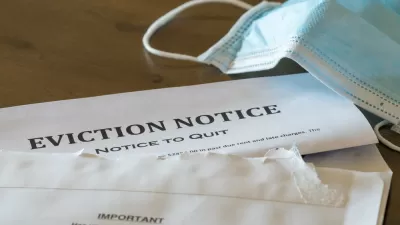The example of Philadelphia shows how a land value tax could provide relief to residents and the city's finances.

Josie Faass writes an argument in favor of a land value tax—an argument bolstered, according to the article, by how the city's real estate tax has fared during the pandemic.
"Based on the assessed value of an owner’s buildings and land, real estate taxes have remained in the black since the pandemic began, increasing more than 5% over last July’s total," writes Faass.
Faass makes the case that a simple change could leverage the stability of property taxes to ease the burden of the pandemic's economic downturn.
Because through a simple mathematical rejiggering of the tax code, Philadelphia could alleviate tax burdens on its most at-risk populations without reducing the overall revenue stream one dime — effectively creating a free stimulus for homeowners and businesses struggling to make ends meet. Philadelphia can create an environment of shared and increased prosperity.
The difference between a property tax and a land value tax is where the nuts and bolts of the "rejiggering" suggested here is found. In Philadelphia, the value of buildings makes up the vast majority of property tax bills, at 76 percent, versus just 24 percent for the value of the land, according to Faass.
If Philadelphia shifted to just a 50-50 ratio of tax on buildings to tax on land, homeowners would see a savings of over $60M each year, and with land value tax or LVT, that total jumps to about $123M — that’s over 10% less than residential property owners pay now, and in a city where the median household income is less than $48,000 a year, this will have real impact.
The difference would be made up for by land speculators, or "exactly who you'd hope," according to Faass.
FULL STORY: How a land value tax could make Philadelphia a more equitable city

Maui's Vacation Rental Debate Turns Ugly
Verbal attacks, misinformation campaigns and fistfights plague a high-stakes debate to convert thousands of vacation rentals into long-term housing.

Planetizen Federal Action Tracker
A weekly monitor of how Trump’s orders and actions are impacting planners and planning in America.

San Francisco Suspends Traffic Calming Amidst Record Deaths
Citing “a challenging fiscal landscape,” the city will cease the program on the heels of 42 traffic deaths, including 24 pedestrians.

Defunct Pittsburgh Power Plant to Become Residential Tower
A decommissioned steam heat plant will be redeveloped into almost 100 affordable housing units.

Trump Prompts Restructuring of Transportation Research Board in “Unprecedented Overreach”
The TRB has eliminated more than half of its committees including those focused on climate, equity, and cities.

Amtrak Rolls Out New Orleans to Alabama “Mardi Gras” Train
The new service will operate morning and evening departures between Mobile and New Orleans.
Urban Design for Planners 1: Software Tools
This six-course series explores essential urban design concepts using open source software and equips planners with the tools they need to participate fully in the urban design process.
Planning for Universal Design
Learn the tools for implementing Universal Design in planning regulations.
Heyer Gruel & Associates PA
JM Goldson LLC
Custer County Colorado
City of Camden Redevelopment Agency
City of Astoria
Transportation Research & Education Center (TREC) at Portland State University
Jefferson Parish Government
Camden Redevelopment Agency
City of Claremont





























